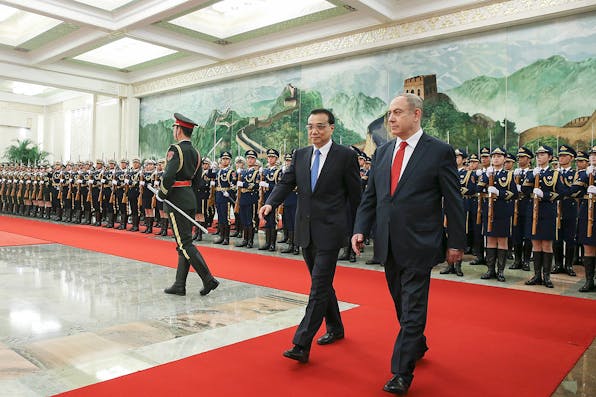
November 19, 2018
Israel’s Strategy toward China Doesn’t Conflict with American Interests—It Serves and Reinforces Them
Partnering with Beijing can help stabilize the Middle East; partnering with Asian nations threatened by Beijing can help build a counterbalance to Chinese power.
Last month, Wang Qushan, vice-president of the People’s Republic of China (PRC), paid a visit to Israel during which, together with Prime Minister Netanyahu, he attended the fourth session of Israel’s Innovation Summit. Also attending the conference was Jack Ma, founder and CEO of the global conglomerate Alibaba, who has made Israel one of his favorite destinations—which is another indication that Chinese business leaders take Israel seriously despite the obvious discrepancy in the two countries’ size and population. The visit, and the pattern of cooperation established by previous sessions of the China-Israel Joint Committee on Innovation Cooperation, lend weight to Arthur Herman’s description in Mosaic of the fast-growing relationship between these two dramatically unequal but mutually respectful peoples of ancient lineage.
Yet Herman also fears that Israel will be swept into China’s more powerful orbit, and that this may create a gaping hole in the West’s technological defenses against encroaching Chinese ambitions. In this, Herman is not alone among either Israelis or Americans. He quotes, for instance, the stern cautions of Israeli Rear Admiral Shaul Chorev on the future of Haifa harbor, a longstanding port-of-call for the American Sixth Fleet whose operation is now under contract to Chinese corporations. Such cautions are reportedly voiced more angrily by American officials alarmed at the possibilities for Chinese surveillance and information-gathering. The PRC also presents a fierce challenge to both Jerusalem and Washington in the field of cybertechnology (a point Herman mentions but does not elaborate upon), potentially creating severe consequences for their defenses against cyber espionage.
Nevertheless, in my judgment both Herman and Trump administration officials overstate the magnitude of the threat—perhaps because they have neglected to take fully into account the broader scope of Israel’s interests in the Middle East and Asia. Those interests in fact coincide with and reinforce the national interests of the United States.
Responses to November ’s Essay

November 2018
Israel Mustn’t Let Its Economic Relationship with China Threaten Its Political Relationship with America
By Elliott Abrams
November 2018
Israel’s Embrace of China Is Sorely Misguided
By Dan Blumenthal
November 2018
Israel’s Strategy toward China Doesn’t Conflict with American Interests—It Serves and Reinforces Them
By Eran Lerman
November 2018
Israel Is Playing on the Global Stage Now, and Its Strategists Need to Act Like It
By Arthur Herman